
Exclusive Interview with Mike Gascoyne
Atlas F1 Magazine Writer
Renault's technical director Mike Gascoyne didn't plan to be in motor racing when he studied aerodynamics in Cambridge, and he didn't have great interest in Formula One when he applied for a job at McLaren in 1989. Fourteen years later, the forty-year-old Briton is one of the rising stars in the exclusive club of successful designers and chief mechanics, striking success at Renault and surrounded by rumours of multi-million dollar offers from rivals. "You always have to realise how lucky you are," he tells David Cameron, in an exclusive interview for Atlas F1
Gascoyne finds himself in the enviable position of having designed one of the most improved cars on the circuit this year, having led the team from the nadir of 2001, when Jenson Button qualified 20th or worse six times over the season, to a stage where his cars have already claimed this year a pole position, fastest lap and a pair of podium finishes. This success has been noted by other, less successful teams, and rumours are abound of multi-million dollar offers for his services.
There was nothing in his past to point towards Gascoyne being one of those people, but it happened nonetheless. Born just forty years ago in Norwich, England, he had a fairly normal childhood, played a lot of sport and nurtured a keen interest in engineering. So far, so normal. He applied himself and was accepted to Cambridge, where he read in the fairly obscure field of aerodynamics and fluid mechanics. He continued with his sport, in particular becoming an avid mountaineer, and studied in a field that was the preserve of geeks and misfits. He must have had some unusual parties, drawing friends from all of those interests.
Doing well in a number of fields marks you out, draws interest in you, because you can talk about more than just the endeavour that you're engaged in at the time, and this is what marked Gascoyne's card, what drew people to him and thrust him forward. People gravitated to him, and this only pushed him further.
He took a job at Westland Helicopters while he was writing up his thesis, the summation of his six years' studying, because he wanted a bit of money and because it's what you do - get some hands-on experience in the field to go with all that theory. And it was while he was there that his first stroke of good fortune happened. "I saw an old copy of Flight magazine - it was three months old - and there was an advertisement for a job as an aerodynamicist at McLaren," Gascoyne recalls. "I didn't really have a long term interest in Formula One, but I used to watch the odd race. So I thought, that looks pretty interesting, and I'm an aerodynamicist, so I wrote off and got the job - and that was that.
"I didn't really have any burning desire that motor racing was what I wanted to do - I was just in the right place at the right time and went to McLaren at the start of '89. So I sort of lucked in, really." And so began his seemingly unassailable rise to the top.
Gascoyne stayed with McLaren for eighteen months, learning the ropes before moving to Tyrrell - a career move which would affect his life more than any other, and a time that he still talks about fondly. The stop was brief, as he was part of a group of engineers headhunted by Sauber to create a programme to let the team go racing in Formula One.
After two years at Sauber, Gascoyne returned to his spiritual home of Tyrrell, working his way up through the ranks there to the position of chief designer - the position he held when the group headed by Craig Pollock took over the company in 1998, starting the process of creating BAR from its ashes. Eddie Jordan saw his chance and swooped in for Gascoyne's services, making him chief designer under Gary Anderson, and he remained with the Jordan team until moving to Benetton/Renault in 2001 - reportedly parting ways with Jordan on not-so-amicable terms.
The Mentor
Every young star in the rising needs a mentor, an older and wiser head who can temper natural enthusiasm with the wisdom he's gained over the years, and for Gascoyne that mentor came in the form of Harvey Postlethwaite, the legendary engineer and team manager, who died of a heart attack three years ago. It was Postlethwaite who brought Gascoyne to Tyrrell in 1991.
Gascoyne knows he owes his career to Postlethwaite, and his love for the man is obvious: "Harvey was a great character who liked to enjoy life and have a laugh about things. He was also a very clever engineer, and a very intellectual guy, so he was a great mixture of intellect, experience and a love of life.
Postlethwaite came along at the right time in Gascoyne's nascent career, when he had learnt enough about the groundwork required and was hungering for the opportunity to do more. "I started as an aerodynamicist at McLaren," he recalls, "and in those days you had much smaller teams and did a lot more than you're able to do now. For example, When Harvey Postlethwaite and I went to Sauber, he set up the engineering department from scratch, really, because they didn't have a Formula One level aerodynamic programme, and when you've actually got to do everything, set everything up, you learn a hell of a lot."
The next stage was set - Gascoyne had proven himself as an aerodynamicist, and Postlethwaite knew he could do more. "I was very lucky in going back to Tyrrell, in that Harvey at that stage didn't want me to come back as an aerodynamicist because he already had a team to do the aerodynamics," he continues, "and I always thought that to get on you had to get out of aerodynamics and into more general car design. I was very fortunate, because really I'd only been in the business four or five years, and the next step was to become deputy technical director at Tyrrell.
"It was a small team, where you were able to make your mistakes and, you know, a couple of the cars - like the 023 and the 025 - were pretty shite! So probably in a way that you couldn't do now, I was in a very small team - a very good, very professional team, and we did a very good job on what we had - but you were able to make your mistakes and that's just not possible now in Formula One. So I was very fortunate to work in Tyrrell in that era."
Engineers need to make mistakes - it's in these errors that they find the best way to get something done, to make something work. It's what they all need to do before moving on to bigger challenges. "I think you learn more from your mistakes than the things that you do right," Gascoyne concurs. "And at Tyrrell you were able to do that. It was a very small, close-knit team, and it was only really when I'd moved on to Jordan that I had to start managing a larger team. And that was a great challenge, but something that seemed to come fairly naturally, you know, and has led to here."
"Here" is Renault, the team Gascoyne joined in 2001, a mere twelve years from his first step onto the bottom rung of the sport. Since joining the team as technical director it has progressed from fighting the Minardis at the back of the pack into a genuine top four contender. It's an astonishing rise through the ranks by any standards, and Gascoyne knows it. "The thing that amazes me is I love engineering and I love sport, so from that point of view this is the ideal profession, and at times I sit and look at it and think, if I hadn't lucked into getting into it, what the fuck would I be doing?
"You know, this is such a strange and bizarre world, really. For me I think it beats having a real job! You know you're very fortunate to be in the position, so yeah, at times you stop and think, and actually you look at the career where I have come up pretty quickly, and you think of all the people who are trying to do that and want to get into Formula One, who watch it and are avid fans and all of that, and you think how did I luck into all of this, because it was never really the plan. So yeah, I think you always have to realise how lucky you are."
Doing it his Way
Gascoyne laughs a lot, and considering his success he should. It's something he got from his mentor, and his management style was learnt there too. "I think one of the things I learnt from Harvey was how to manage people and to get the best out of people," he says. "Harvey was great at having a meeting to discuss something where he would just ask you why you were doing things, and get people to throw in more ideas, and eventually you would come up with a solution that was perhaps totally different from what you were going to do but was a totally innovative solution, and you'd leave the meeting kind of thinking you'd come up with it, not that you were called in to be told by him what you were going to do."
The challenges of running an operation the size of Renault are such that he can't be very hands-on anymore - there are so many departments to oversee that he can no longer go down and fix things himself. "I set the standards for the team in all the areas, and then hopefully empower people to achieve them," he says.
"Sometimes, when something hasn't been done well enough, they'll sit there and say 'but we worked all night - what else could we have done?' And you say 'yeah, in the set of circumstances you had, you couldn't have done anything else'; but the whole point is to change the set of circumstances, and that's my job.
"So when I say I want something done to this level, if I don't hear anything then I expect to come in and see it at that level. And if it isn't at that level, things get shitty! But if you've contacted me and said 'we've got this problem and this problem and this problem' I'll either say 'well you can't do it to that level because we can't solve some of those problems', or I'll solve some of those problems for you, so you can get to that level. But what I won't accept is coming in and it's just not at that level. So really, it's a case of setting the standards, and then ensuring your team can get to them, and then moving them up."
The standard bearer for success in his field is Ross Brawn, who moved to Ferrari from Benetton and built an engineering team around him, bringing some key personnel and then molding them into the Ferrari fold. It's an approach that has brought much success to the team in red, and it's an approach that Gascoyne is attempting to emulate, albeit in his own style. "People sort of say at Renault that [Brawn] brought his people, he brought a lot of his team in," he notes sardonically. "Well, when I went to Jordan we did a good job and I didn't bring any people in - those people were already there, and so most of the people you need are in any team.
"The trick is to get them all working efficiently, and I think we've done that very effectively in the two or three years at Renault. And yeah, you do tend to bring people in that you know, and that you know will work to the standard I set, and who you know get on with people and can help build the team. But really, in any team, that's only four or five people in key areas where they're lacking - it's not ten, twenty, thirty people. You don't need to do that. All the right people exist in most of the teams - the trick is to organise them and get the best out of them, and I think that's what I've been able to do at Jordan, and here at Renault."
The Friday Testing Gamble
The proof of the pudding is in the eating, and the start of this year showed that Gascoyne has got the balance right. It was an astonishing start, and people were talking about the team as real Championship contenders, with early development of the car starting like a bullet from a gun, although this seems to have fallen off a little since then. "I don't think that's strictly true," Gascoyne reacts. "I think we maximised, we got a lot out of it in the beginning, and also I think at the beginning of the year we were more aggressive on strategy in qualifying, running light, and now everyone else is doing that and I think actually you see the true level of performance.
"I mean, I've been here for three years now and I think what we've achieved is pretty good. It took Ross Brawn five years with Michael Schumacher to win a Championship at Ferrari, so I think it's asking quite a lot to do it in two or three years here. And, as I say, there are elements of the package that aren't where they need to be - they're getting there, but it does take time."
Many eyebrows were raised when Renault signed up for the new Friday morning testing scheme, put forward by FIA president Max Mosley at the end of last year presumably as a bone thrown out to help the smaller teams that couldn't fund a full testing team. Nevertheless, Gascoyne could see the advantages for his team and persuaded team principal Flavio Briatore to sign up for it.
"I think one of the reasons why we looked extra competitive at the start of the year is that the private [Friday testing] sessions are beneficial for a race weekend," he states. "Of course at the start of the year you've done as much testing as everyone else, and you've got the extra advantage of the Friday testing. I think it made us be much, much more efficient in the testing we do, so in that respect it's actually been beneficial to the team.
"The concern - and I expressed it at the start of the year - is always around now, when people are doing a lot of running, a lot of testing. The only area it's really hurting us in is tyre development. There's a lot of people doing a lot of miles with tyres, and now there's a lot of different specs of tyres. We certainly haven't been able to match that pace, which can have a big effect on a race weekend if someone's on a new construction that we didn't have time to test and didn't select, and if that tyre does work then that can be half a second and there's not much you can do about that. So in terms of development on the car I don't think the lack of testing has hurt us at all; I think it's really only in the area of tyre testing that I have concern."
Trulli Vs. Alonso
The added bonus for Gascoyne this year has been the performances of Fernando Alonso, who has come from almost nowhere to become a star overnight. His accomplishments have been so impressive that Briatore has stated the team will be built around the young Spaniard, although Gascoyne denies that he is getting any mechanical advantages over his teammate. "I think probably that's been a little misinterpreted," he says. "You build it around both drivers, and these two guys get on very well together. I mean, Fernando is obviously a very exceptional talent, but I think you shouldn't underestimate Jarno.
"People tend to think teammates getting at each other is good for competition. But I think these two have that spur of competition, because they each know the other one is fucking quick, so you don't need much more of a spur than that. But they do it in a very light-hearted, sociable way, and they actively help each other, you know; if one of them has a problem then the other one will sit down and say 'yeah, I had that - I tried this, I tried that, and I found this works'. So they are very good at helping each other, and I think that is to the benefit of the team and a credit to both of them."
Jarno Trulli is an enigma in Formula One - he breezed into the sport seemingly effortlessly and with a reputation of being astonishingly quick, and yet this potential hasn't manifested itself in race results. It's a mystery that Gascoyne himself still can't quite grasp. "I think Jarno does have races where he goes to sleep a little bit," he admits, "but in terms of outright speed this year, Jarno's actually been quicker than Fernando.
"There are a lot of good guys out there, and then there are two or three that have just that extra little bit, and Jarno on a qualifying lap is one of the two or three who has that extra little bit. He needs to be on it all the time in races, and he's frustrated by that, and you see races where he does do it - the end of last year, in Monza, where he had a fantastic drive from the back of the grid, for instance - and at that point he is one of those special drivers.
"On the down side, I think when he has a problem, it maybe would cost him one or two tenths [per lap] in a race. Fernando will race that car two tenths slower, whereas at times Jarno makes that two tenths into a second - he magnifies small problems - but they are real problems, and that's what causes inconsistencies. But when it's right, ultimately I think he's actually quicker than Fernando."
Gascoyne continues: "I think Fernando's one of the drivers who just gets in and does it, and just does every lap as quickly as it can go - he doesn't think about it, doesn't worry about it, and he gets out and shrugs his shoulders and says 'that was easy'. Jarno thinks about it more, and sometimes probably just needs to stop worrying about it and just drive the shit out of it. But they are both incredibly fast."
The Next Challenge
Having two quick drivers in a nimble car of his design, means that Gascoyne is enjoying life right now. But given his career path you could wonder if he is planning another move, another challenge, and the rumour mill is currently grinding out a story linking him to a move to Toyota, a team that came into the sport last year with a lot of money to spend and no real results to speak of to date.
The design process at Renault is such that they have two design teams working concurrently - one on the present car and one on next year's car. The latter design is clearly well underway, and Gascoyne knows what the next step for the team is and what he wants from the car. "To win some races," he exclaims.
"Next year's going to be interesting, with the one-engine-per-weekend thing, and we've obviously made some changes in the direction we've gone on the engine, the prime reason being that. We've made a lot of progress, and the next step on the ladder is to win some motor races, and a Championship.
"When I went to McLaren it was great to be an aerodynamicist in Formula One. When I went to Tyrrell it was great just to design a car - a lot of people don't get that chance. When I went to Jordan I could design a car that wins races, and it was great and we did. The next step is to design a car that wins a Championship. So that's got to be the next step."
This is the burning desire for Gascoyne, and why a move to Toyota is unlikely - he won't want to go through the build up process again when he's already in a team that is near the front of the grid, at least not until he achieved the higher cause.
"I've always been very competitive, and if you're a competitive person you want to win," he states quietly. "And for me that's the Constructors' Championship - that's the thing I can win. The driver wins the Drivers' Championship, but I want my team to win the Constructors' Championship, and that's still very much the ambition."
However, if he does bring home a Championship, don't expect him to hang around in the paddock for too long. Formula One is an exhausting business, and Gascoyne is well aware of the toll it can extract. "I've learnt a lot from Harvey Postleswaithe, and dying from a heart attack in the pitlane at the age of 55 is probably a good lesson to learn from him as well," he says dryly. "Motor racing isn't the Be All and End All in my life - my family is very important. I've worked very hard and been very committed, but I don't see myself in 15 or 20 years' time in the pitlane at all.
"I think anything I do, I do it 100%. So while I'm doing motor racing I'll do it 100%, but when I stop, I'll stop 100% as well and go and do something else. The thing is, it pays well and it keeps you busy, so if you're going to stop you've got to have something else to do. But I don't see all my working life in motor racing."
He never actually finished his thesis at university, and as such didn't get his doctorate, which could help him fill the time after Formula One. Not that he minds so much. "Titles aren't something that turn me on very much," he notes, before drifting off into an anecdote. "Interestingly, I went back to Cambridge a few years ago and met my old tutors and sort of apologised for not writing it up. The funny thing was they were kind of courting me as a successful student, someone who is high up in engineering, so they were treating me royally, and I was like the naughty schoolboy who hadn't finished his thesis! I said this to the head of department and he looked at me and said 'when did you leave?' I told him about ten years ago and he said 'well, there's plenty of time then!'
"Doing the PhD was great, because I played a lot of sport and did a lot of mountaineering and had a great time, but also because it did get me the next rung on the ladder. I wouldn't have got the job at McLaren without the PhD in fluid mechanics, so in effect the qualification got me the position, and once you had the position at McLaren you didn't need [the thesis], and I don't need to call myself doctor to be able to run a racing team. So, no... I mean, it's probably the only thing in my life that I didn't actually finish and achieve, so I suppose that is always a frustration, but I've been too busy since then to worry about it."
But then a cheeky smirk creases his face, and he continues: "Still, if I keep in this business long enough maybe they'll give me an honourary one or something. After all, Eddie Jordan got one..."
Do you wake up happy every day? Are you glad to go to work knowing that it's what you really want to do, and secure in the knowledge that those who employ you are glad to have you? Mike Gascoyne, the technical director of Renault's F1 team, does.
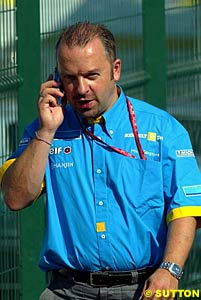 Some people just seem to have everything work out right for them, have everything fall in place as they rise through the ranks as though the finger of God is pointing at them and singling them out for more. You've met people like this at your work, and you've probably wondered how the hell it happened that they have everything handed to them on a plate. The thing is, they probably don't know either, but they'll make the most of it while it lasts.
Some people just seem to have everything work out right for them, have everything fall in place as they rise through the ranks as though the finger of God is pointing at them and singling them out for more. You've met people like this at your work, and you've probably wondered how the hell it happened that they have everything handed to them on a plate. The thing is, they probably don't know either, but they'll make the most of it while it lasts.
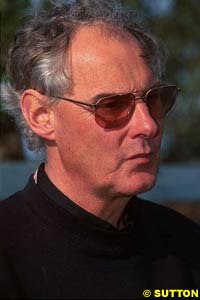 "And there was never a day where you couldn't sit down and have a laugh about it at the end, no matter how hard you worked. I think Harvey was a great influence on me, and also I think Harvey went to his grave trying to prove that Formula One was about engineering and not just having more money - he loved engineering, and I think that's something that's stuck with me. That was a great lesson to learn."
"And there was never a day where you couldn't sit down and have a laugh about it at the end, no matter how hard you worked. I think Harvey was a great influence on me, and also I think Harvey went to his grave trying to prove that Formula One was about engineering and not just having more money - he loved engineering, and I think that's something that's stuck with me. That was a great lesson to learn."
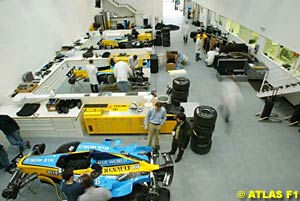 The difference, of course, is the scale - what works in a small team may not necessarily carry over into one the size of Renault. This is something Gascoyne says he thinks about constantly, and it's the reason why he puts such a premium on communication. "I think the important thing is to set the standards. There are engineering decisions to be made, but most important to Formula One you've got to have the right organisation and the right level of communication to allow people to function without becoming a large bureaucracy. You see some teams that are just large bureaucracies - they have meetings just to hear twenty people spout off about something - and I think that's not efficient."
The difference, of course, is the scale - what works in a small team may not necessarily carry over into one the size of Renault. This is something Gascoyne says he thinks about constantly, and it's the reason why he puts such a premium on communication. "I think the important thing is to set the standards. There are engineering decisions to be made, but most important to Formula One you've got to have the right organisation and the right level of communication to allow people to function without becoming a large bureaucracy. You see some teams that are just large bureaucracies - they have meetings just to hear twenty people spout off about something - and I think that's not efficient."
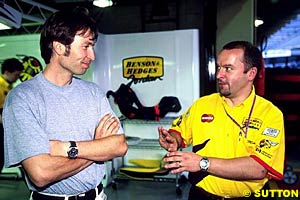 "You know, people say 'oh you're not quite there', but only two races ago in Canada Fernando ended two seconds behind the leader. To win consistently you've got to have everything right, and we've been fairly open that at the moment we don't have everything right - the engine isn't at the top level, for one - so when it's like that you're not going to win everywhere, and when you get it all right a-la Ferrari last year then yeah, you go and win everywhere. We're not in that position, and to get it all right takes time - you can't do it all in a year, two years.
"You know, people say 'oh you're not quite there', but only two races ago in Canada Fernando ended two seconds behind the leader. To win consistently you've got to have everything right, and we've been fairly open that at the moment we don't have everything right - the engine isn't at the top level, for one - so when it's like that you're not going to win everywhere, and when you get it all right a-la Ferrari last year then yeah, you go and win everywhere. We're not in that position, and to get it all right takes time - you can't do it all in a year, two years.
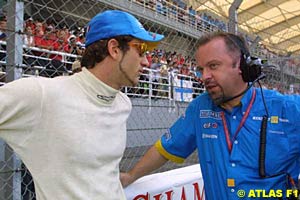 "Jarno is one of the quickest guys over one lap - he has had races where he struggled for consistency, but he was quicker than Fernando at the Nurburgring, and I think he'll be quicker here (in Magny Cours). I think Jarno did a fantastic job here yesterday (in the French GP's Saturday qualifying) - he had a problem in warm up, and yet he still went and outqualified Fernando, and that was a great job. But I think the fact they get on so well together is very important, and it's allowing Fernando to develop his career without the pressure of having someone trying to beat him, screw him - I don't think the effect of that should be underestimated.
"Jarno is one of the quickest guys over one lap - he has had races where he struggled for consistency, but he was quicker than Fernando at the Nurburgring, and I think he'll be quicker here (in Magny Cours). I think Jarno did a fantastic job here yesterday (in the French GP's Saturday qualifying) - he had a problem in warm up, and yet he still went and outqualified Fernando, and that was a great job. But I think the fact they get on so well together is very important, and it's allowing Fernando to develop his career without the pressure of having someone trying to beat him, screw him - I don't think the effect of that should be underestimated.
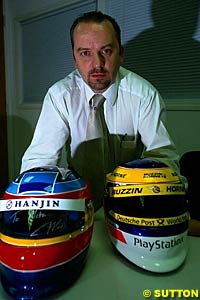 "Well I'm not going to comment on those rumours," Gascoyne states, before adding: "the only thing I would say - and it's something I said to Eddie [Jordan] when I was there - when I do the job, I do it at 100%. I'm here at Renault and trying 100% to win at Renault, and I'll do that until the day that I'm not at Renault, and then I'll try 100% to beat them the day after! That's the way of the world, but I've got no comment to make specifically."
"Well I'm not going to comment on those rumours," Gascoyne states, before adding: "the only thing I would say - and it's something I said to Eddie [Jordan] when I was there - when I do the job, I do it at 100%. I'm here at Renault and trying 100% to win at Renault, and I'll do that until the day that I'm not at Renault, and then I'll try 100% to beat them the day after! That's the way of the world, but I've got no comment to make specifically."
Please Contact Us for permission to republish this or any other material from Atlas F1.
|
Volume 9, Issue 29
Atlas F1 Exclusive
Interview with Mike Gascoyne
Giancarlo Fisichella: Through the Visor
Articles
Season in the Sun
Rear View Mirror Returns
2003 British GP Preview
2003 British GP Preview
British GP Facts & Stats
Columns
The Fuel Stop
The F1 Trivia Quiz
Bookworm Critique
On the Road
Elsewhere in Racing
The Weekly Grapevine
> Homepage |